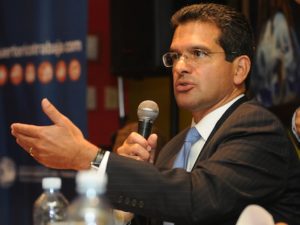
A little before midnight Thursday House Republicans presented a bill to deal with the Puerto Rico debt crisis. The bill was introduced by Rep. Sean Duffy, Rep. Rob Bishop, who is the chairman of the Committee on Natural Resources and Rep. James Sensenbrenner.
Duffy said in a statement that “Years of disastrous policies have completely wrecked Puerto Rico’s economy. As a result, the island and its millions of American citizens face a humanitarian crisis.” Puerto Rico has been suffering a grave fiscal crisis, the island has a $72 billion debt and has defaulted on bond payments. There is another multimillion payment looming over the territory in July. The financial issues have forced hundreds of thousands of residents, who are American citizens, to move to the U.S. mainland in order to seek work.
The bill was introduced and Puerto Rico’s representative in Congress, Pedro Pierluisi. Soon after, he issued a statement saying the bill was much improved from an earlier version. Pierluisi has been pushing U.S. lawmakers to take action to help the economic crisis the island territory is facing.
Pedro Pierluisi, Puerto Rico’s resident commissioner in Congress, said that while the bill is not perfect and does not meet all of his criteria for his support, it is possible that he’ll be able to support it. “Like any product of bipartisan compromise, it contains provisions I oppose or view as unnecessary and it is my hope these provisions can be modified or removed as the legislative process moves forward,” he said in a statement. “However the heart of the bill – the debt restructuring section and the oversight board section – comes far closer to meeting the stringent criteria I established in order for the legislation to earn my support,” he said.
Bishop, whose committee will hold a hearing on the bill and vote on whether to move it forward to the full House, said the bill has technical refinements and incorporates negotiated changes that were made to an earlier version of the bill. That earlier version of the bill drew heavy criticism and was quickly taken back to negotiations. “Any future changes will be done in public meetings,” Bishop said.

Recent Comments